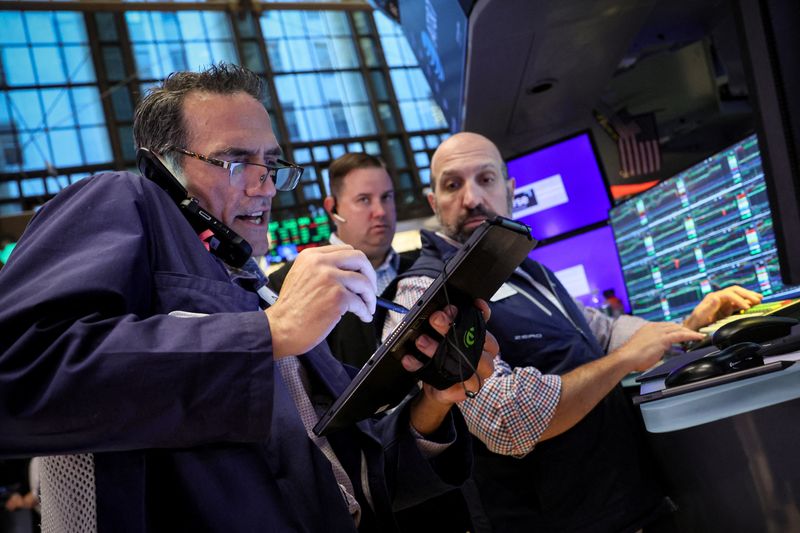By Lewis Krauskopf and Suzanne McGee
(Reuters) - A selloff that rocked equity markets around the world is clouding the outlook for investors looking to buy stocks on the cheap, as worries over the U.S. economy and disappointing tech earnings threaten more losses ahead.
A two-day rout late last week left the S&P 500 nearly 6% from its July peak while the tech-heavy Nasdaq Composite extended losses to notch its first 10% correction from a record high since early 2022. Equities plunged in Europe and Asia as well, with Japan’s Nikkei index losing nearly 5% for the week.
The market tumble presents a dilemma as another week of trading is set to unfold. Jumping into stocks during periods of weakness has rewarded investors over the last two years, as the S&P 500 has climbed about 50% from its Oct 2022 low.
But buyers of the dip risk being steamrolled if recession fears grow following last week’s run of alarming U.S. data. The S&P 500 has fallen an average of 29% during recessions since World War Two, according to Truist Advisory Services.
Saturday's earnings report from legendary investor Warren Buffett’s Berkshire Hathaway (NYSE:BRKa) may also give bargain hunters pause: the conglomerate sold about half its stake in Apple (NASDAQ:AAPL) and let its cash pile soar to $277 billion in the second quarter. Berkshire often lets cash build up when it can't find whole businesses or individual stocks to buy at fair prices.
“People are starting to reassess what their risks are and whether they are properly positioned.” said Mark Travis, a portfolio manager at Intrepid Capital, noting also that elevated valuations are giving investors pause.
Stocks have soared this year in a rally fueled by excitement over artificial intelligence technology and a so-called Goldilocks economy where growth stayed resilient while inflation cooled.
The market’s appetite for risk took a hit this past week. Concerns that the Federal Reserve may be hurting economic growth by waiting too long to cut interest rates pushed traders to dump everything from richly-valued chipmakers to shares of industrial companies and head to safe harbors such as U.S. government bonds.
Selloffs after disappointing earnings from tech-focused companies such as Amazon (NASDAQ:AMZN), Alphabet (NASDAQ:GOOGL) and Intel (NASDAQ:INTC), meanwhile, exacerbated concerns that stocks may have become too richly valued.
BRIGHT SPOTS
Nevertheless, some investors believe the recent tumble is merely a pause in a strong year for markets, and are looking for the opportunity to buy.
“We've been looking to potentially get into some of those expensive names and frustrated we haven't had an opportunity, and now we're getting there," said Lamar Villere, portfolio manager at Villere & Co.
The S&P 500 and Nasdaq are both up around 12% year-to-date even with the recent selloff. Chipmaker Nvidia (NASDAQ:NVDA), whose blistering climb became emblematic of the AI craze, is sitting on a year-to-date gain of about 117%, despite falling more than 20% from its high.
Economists have pointed to bright spots in Friday’s jobs report, including a second straight month of hefty workforce growth. Some also said that Hurricane Beryl, which slammed the Gulf Coast last month, may have skewed the statistics.
And while expectations for tech companies' results may have been high, some of the heavyweights delivered strong earnings, including Apple and Facebook-parent Meta (NASDAQ:META) Platforms.
Big tech stocks “continue to have great businesses, big competitive moats. Their cash flow remains strong,” said Michael Arone, chief investment strategist at State Street (NYSE:STT) Global Advisors. "Investors usually overreact in the short-term."
'FEAR TRADE'
Others, however, have noted that while stock valuations edged lower in the recent selloff, they remain elevated by historical standards.
The S&P 500 was trading last week at 20.8 times forward 12-month earnings estimates, down from 21.7 reached in mid-July, according to LSEG Datastream. The index's long-term average is 15.7 times forward earnings. That could leave stocks primed for further selling if more bad news hits.
“This isn’t a Category 3 hurricane, but we are seeing how markets react to signs that the economy is normalizing after turning hot in the first half of this year,” said Art Hogan, chief market strategist at B. Riley Wealth. “Markets can find themselves overreacting and investors glom on to anything as an excuse to take profits.”
A lack of major economic data releases until the consumer price report on August 14 could keep markets on edge. Indeed, worries over economic growth have traders more spooked than they have been in months.
The Cboe Volatility index - known as Wall Street’s fear gauge - hit its highest since March 2023 on Friday as demand for options protection against a stock market selloff surged.

Meanwhile, the yield on the benchmark 10-year U.S. Treasury, which moves inversely to bond prices, sank nearly 40 basis points this week, the largest weekly fall since March 2020 as investors priced in rate cut expectations and sought shelter from future volatility.
“That's a huge move,” said Michael Farr, president and CEO of Farr, Miller & Washington. “It certainly looks like there's a fear trade there.